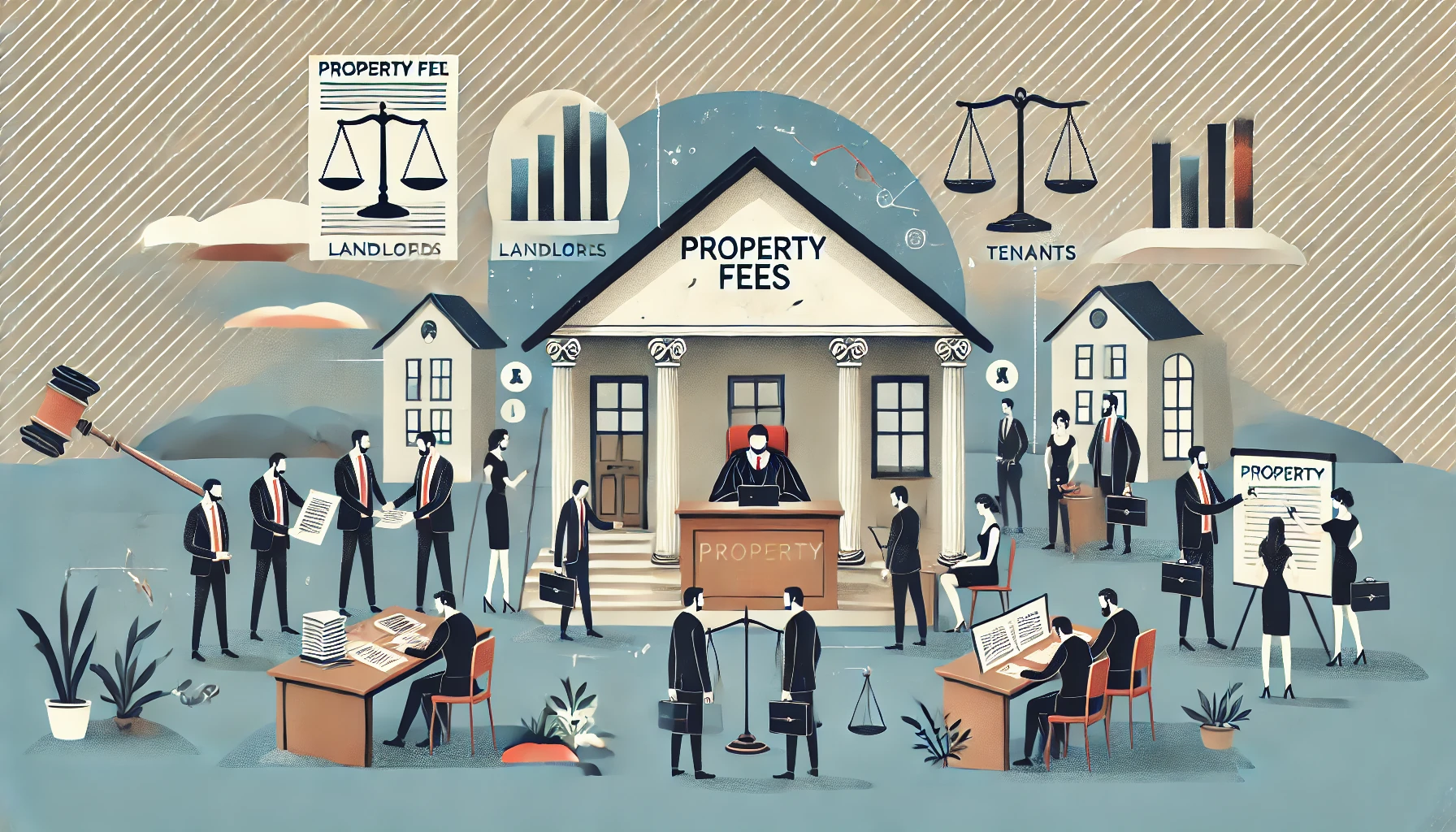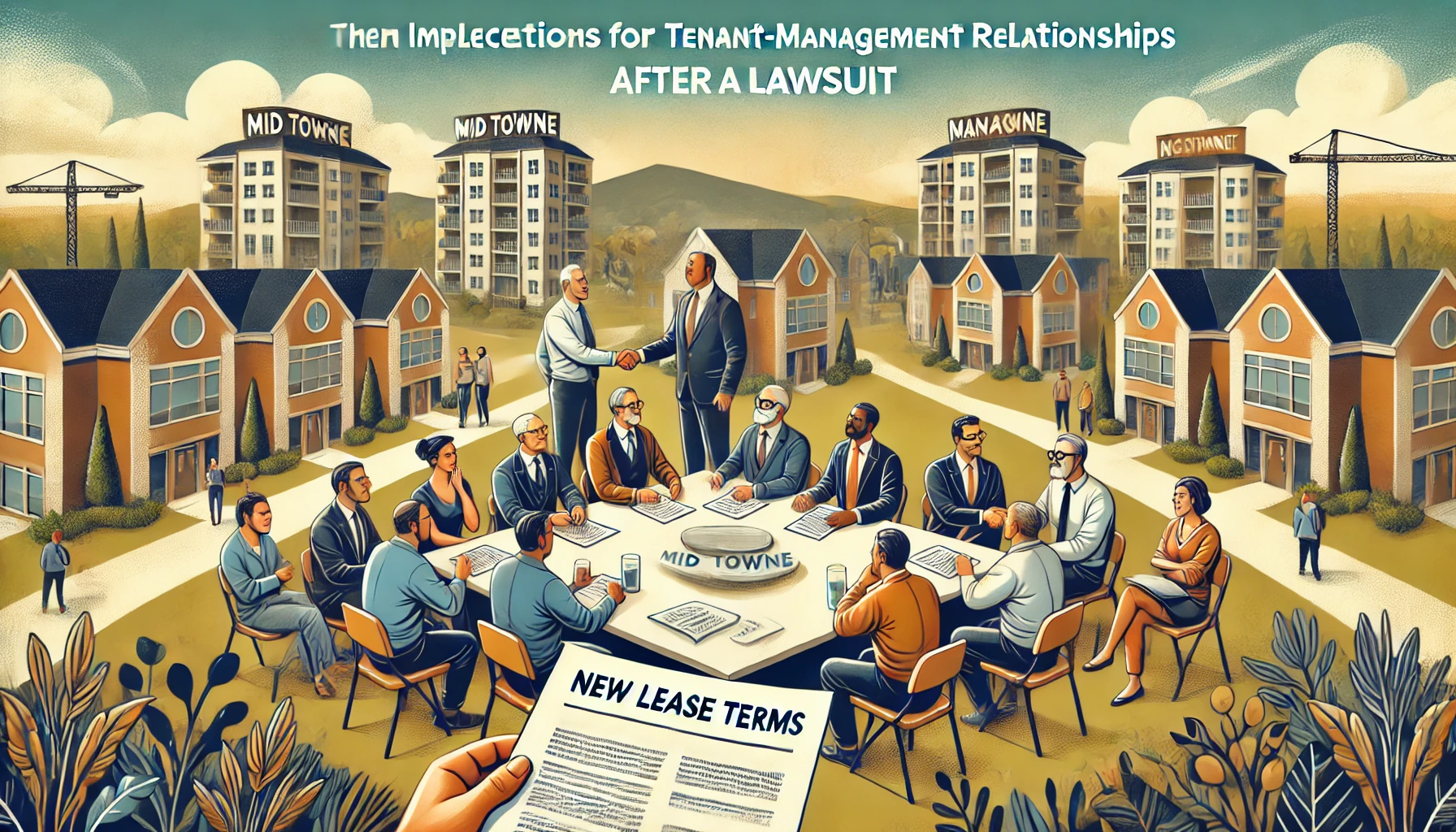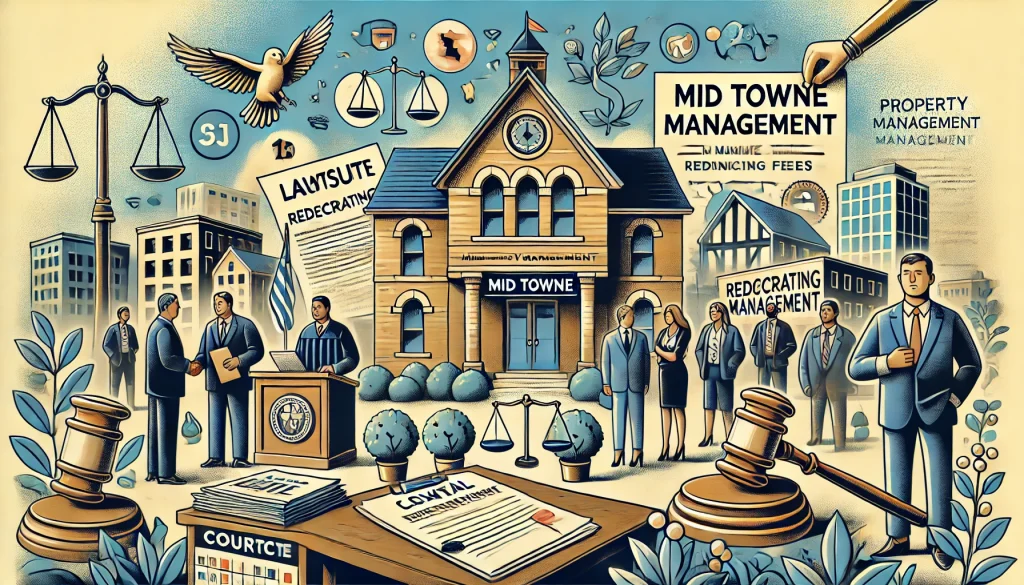The Mid Towne Management Muncie Indiana lawsuit over redecorating fees has drawn significant attention due to its implications for property management and tenant rights. This legal dispute highlights the complexities surrounding rental agreements and the specific charges that can be imposed on tenants. The case has sparked conversations among residents and legal experts alike, raising questions about transparency and fairness in property management practices.
The Mid Towne Management Muncie Indiana lawsuit over redecorating fees centers on claims that tenants were unfairly charged for redecorating costs, which they argue were not justified. Such cases bring to light the importance of clear lease agreements and detailed explanations of additional fees. For many tenants, unexpected charges can lead to financial stress and disputes that impact their living experience.
As the Mid Towne Management Muncie Indiana lawsuit over redecorating fees continues, both tenants and property managers are paying close attention to the developments. This case could potentially set a precedent for how redecorating fees are handled in similar rental agreements across the region. The outcome will be essential in shaping future interactions between landlords and tenants and clarifying the boundaries of additional property charges.
Legal Background of the Redecorating Fees Dispute
The Mid Towne Management Muncie Indiana lawsuit over redecorating fees stems from a broader discussion on tenant rights and property management policies. The origins of this case can be traced to charges imposed by Mid Towne Management on tenants, which included costs for redecorating units. Such charges often involve painting, minor repairs, and cosmetic updates, which can become contentious if tenants believe they are unjustified or unexpected.
This lawsuit focuses on whether these redecorating fees were clearly outlined in the rental agreements or if they were imposed as additional charges. The legal framework surrounding this type of dispute often refers to state landlord-tenant laws, which dictate what property managers can or cannot include as post-tenancy fees.
Legal precedents in Indiana have shown that courts tend to side with tenants if fees are not explicitly mentioned in lease agreements. This case could hinge on the specific wording used in Mid Towne Management’s contracts and whether tenants were aware of the charges they might face upon vacating.
A vital aspect of this case is the documentation presented by both parties. Evidence such as lease clauses, tenant complaints, and previous correspondence between the management and tenants will play a significant role in the court’s decision. Such documents help clarify whether the charges were reasonable or imposed without adequate notice.
Key Legal Arguments in the Mid Towne Management Lawsuit
In the Mid Towne Management Muncie Indiana lawsuit over redecorating fees, both sides have presented compelling arguments. Mid Towne Management contends that the fees were justified based on the condition of the units after tenants moved out. They argue that these charges are necessary to maintain the property and ensure it remains in rentable condition.
On the other hand, tenants have argued that the fees were neither clearly stated in their rental agreements nor adequately explained before being imposed. This argument focuses on the principle of transparency, suggesting that fees should be outlined upfront so tenants can make informed decisions about their housing.
Key legal principles like the implied covenant of good faith and fair dealing are crucial in cases like this. Tenants claim that Mid Towne Management violated this covenant by imposing fees in a way that seemed arbitrary or unfair. Legal experts often highlight that rental agreements need to explicitly state all potential costs to prevent misunderstandings.
Bullet points summarizing tenant arguments:
- Fees were not clearly disclosed in the lease agreements.
- Charges seemed arbitrary and lacked sufficient justification.
- The dispute challenges the property manager’s adherence to fair practices.
Mid Towne Management’s defense also emphasizes that redecorating fees fall under standard maintenance, which they claim tenants should expect. The outcome will depend on how well each side substantiates its claims with evidence and legal interpretation.
How Tenants Are Responding to the Mid Towne Management Muncie Indiana Lawsuit Over Redecorating Fees
The Mid Towne Management Muncie Indiana lawsuit over redecorating fees has stirred strong reactions from tenants, both current and former. Many tenants have voiced their dissatisfaction through social media, tenant associations, and community forums. They argue that unexpected fees create financial strain and make housing less affordable.
Several tenants have organized themselves to seek collective legal advice, showcasing a unified front against what they perceive as an unfair practice. This solidarity not only strengthens their case but also encourages other residents who might have faced similar issues to come forward. Such collective actions often gain attention, prompting local media coverage and broader public discussions.
Some tenants have expressed concerns about whether their rights were violated under Indiana’s tenant protection laws. This has sparked debates on whether more stringent regulations are needed to prevent such disputes in the future. The case has brought to light the importance of tenant education regarding lease agreements and their rights.
Tenants’ response also includes gathering testimonies and documents to present as evidence in court. These may include email exchanges, lease copies, and photographs of unit conditions to argue their side. This collective effort demonstrates the lengths to which tenants are willing to go to challenge practices they see as unjust.
The Financial Impact of the Lawsuit on Mid Towne Management
The Mid Towne Management Muncie Indiana lawsuit over redecorating fees could have significant financial repercussions for the company. Legal battles of this nature often come with hefty legal fees, court costs, and potential compensation if the ruling is not in the management’s favor. Even if Mid Towne Management prevails, the expenses involved in defending the case could impact their budget.

If the court rules against Mid Towne Management, the company might face not only financial penalties but also potential refunds for the tenants involved. This could mean substantial outflows depending on the number of tenants affected and the amounts charged. In some cases, settlements are preferred to avoid prolonged litigation and higher costs.
Chart illustrating potential financial impacts:
| Financial Aspect | Potential Cost/Impact |
| Legal Fees | Significant increase |
| Compensation | Possible large payout |
| Reputation Damage | Loss of tenant trust |
Beyond direct financial implications, the lawsuit could damage the company’s reputation. This might lead to decreased trust among prospective tenants, affecting occupancy rates and revenue in the long term. Reputation in property management is crucial, as it influences the choice of renters looking for reliable and fair landlords.
Moreover, if regulations or court mandates change as a result of this case, Mid Towne Management might need to adjust its lease agreements and fee structures, incurring additional administrative costs.
Main Points of Dispute in the Redecorating Fees Case
The Mid Towne Management Muncie Indiana lawsuit over redecorating fees hinges on several key disputes. First and foremost, tenants argue that the fees were not transparently outlined in their lease agreements. They claim these charges were unexpected and imposed unfairly, creating financial burdens for them upon moving out.
Mid Towne Management, however, insists that the fees were part of standard property maintenance. They argue that maintaining the property’s condition justifies such charges, as redecorating can involve costs related to paint, minor repairs, and preparing units for new tenants. This point has sparked debate on what is considered standard upkeep versus excessive charging.
Tenants have raised the issue of whether the fees were proportional to the work performed. Some argue that the amounts charged far exceeded the actual cost of redecorating, pointing to potential overcharging practices. This adds complexity to the case as it brings in the need for evidence like invoices and records of the work performed.
The timing and communication of these fees are also disputed. Many tenants report that they were unaware of these charges until they received final bills after vacating. The lack of prior notification has been a central complaint, leading to questions about the adequacy of communication and fair warning.
Lastly, the burden of proof lies on both parties: tenants need to demonstrate that the charges were not justified or disclosed, while Mid Towne Management must show that the fees align with standard leasing practices.
Community Perspectives on the Lawsuit in Muncie, Indiana
The Mid Towne Management Muncie Indiana lawsuit over redecorating fees has sparked varied reactions within the local community. Tenants’ rights groups have shown strong support for the plaintiffs, arguing that the case highlights issues with transparency and fair practices in property management. They believe that a favorable outcome for the tenants could pave the way for stronger tenant protections.
Local property owners and landlords, however, have expressed concerns about how the lawsuit’s outcome might impact their own practices. They fear that a ruling against Mid Towne Management could set a precedent leading to increased scrutiny and regulation of fee structures in rental agreements.
Residents who are not directly involved have shown interest in how this case could influence rental market practices. Many Muncie residents have shared stories of their own experiences with hidden fees and unexpected charges, viewing this case as part of a broader issue in the rental industry.
Local media outlets have been covering the lawsuit, adding to public discourse by featuring tenant testimonies and expert opinions. This media attention has increased community engagement, making the case a topic of conversation in public forums and social events.
The community’s response underscores the balance needed between protecting tenant rights and allowing property managers to maintain their properties efficiently. The outcome of this case will likely resonate beyond the immediate parties, influencing future tenant-management relationships across Muncie and beyond.
Potential Outcomes of the Mid Towne Management Case
The Mid Towne Management Muncie Indiana lawsuit over redecorating fees could have several potential outcomes, each carrying different implications. One possible result is a ruling in favor of the tenants, which would mean Mid Towne Management might need to refund charges to affected tenants and pay legal fees. This outcome would also likely prompt a review and revision of current lease agreements.
If the court sides with Mid Towne Management, it would validate their claim that the fees were standard and justified. This ruling could reinforce the company’s practices, potentially setting an example for other property managers. However, it could also lead to stricter regulations if tenant advocacy groups push for changes.
A settlement could also be reached before the case concludes in court. In such cases, both parties agree on terms that may include partial refunds or adjustments to the fees charged. This could save both parties the time and expenses of a drawn-out court battle.
Chart illustrating potential outcomes:
| Outcome | Impact on Parties |
| Ruling for Tenants | Refunds, lease revision |
| Ruling for Management | Practice validation |
| Settlement | Compromise, reduced costs |
Another outcome could involve a mixed decision, where the court finds that some fees were justified while others were not. This nuanced ruling could create partial relief for tenants and require management to improve transparency.
Legal Procedures for Addressing Property Fee Disagreements
When cases like the Mid Towne Management Muncie Indiana lawsuit over redecorating fees arise, they follow specific legal procedures. Typically, the process begins when tenants file a formal complaint or lawsuit, often after failed attempts at resolution through direct negotiation. Legal representation for both sides is crucial to navigate these procedures effectively.

The court then examines the lease agreements, correspondence, and any evidence submitted by both parties. The focus is on whether the lease explicitly mentioned redecorating fees and if the fees align with state and local regulations. Indiana law provides guidelines that landlords must follow to justify charges beyond regular rent.
Mediation is sometimes suggested as an alternative to court proceedings. This can be a way to reach a settlement without the high costs and time involved in litigation. Mediation allows both parties to present their cases in a less formal setting, often leading to compromises and resolutions.
If the case proceeds in court, tenants and landlords can expect hearings where both sides present testimony and evidence. Witnesses, such as former tenants or property maintenance staff, might be called to testify about the typical procedures and charges for redecorating.
The final step involves the court’s decision, which could include ordering compensation, dismissing the case, or mandating changes to lease practices. The judgment can set a precedent affecting future property management policies.
Comparisons to Other Property Fee Disputes in Indiana
The Mid Towne Management Muncie Indiana lawsuit over redecorating fees is not the first case of its kind in Indiana. Previous property fee disputes often revolved around unclear lease agreements and additional charges that tenants claimed were unfair. Similar cases have highlighted a recurring pattern of property managers imposing fees for services that tenants believed were part of normal wear and tear.
One notable comparison can be made to a past case in Indianapolis where a landlord charged tenants for carpet replacement, stating that it fell under maintenance fees. The court ruled that unless explicitly stated in the lease, such fees could not be imposed after tenants vacated. This precedent might influence how the current Mid Towne Management case is evaluated.
Some property fee disputes have ended in settlements, with landlords agreeing to revise lease agreements and provide clearer communication to tenants. These outcomes show that clarity in lease documentation is crucial to prevent similar disputes. Indiana courts have shown a tendency to protect tenants when ambiguities exist in rental agreements.
It’s also worth noting that some disputes have led to broader discussions on the need for tenant protection laws in Indiana. Advocacy groups have used such cases to push for regulations that mandate clearer fee disclosures and limit surprise charges.
Overall, the Mid Towne Management Muncie Indiana lawsuit over redecorating fees follows a familiar path of contention seen in other Indiana cases, where lease transparency and fee justification are central issues.
Expert Analysis of Property Redecorating Fee Lawsuits
Experts have weighed in on cases like the Mid Towne Management Muncie Indiana lawsuit over redecorating fees, noting that property redecorating fees often fall into a gray area. Property law specialists highlight that whether such fees are valid depends on the specificity of lease terms and the justification provided by landlords.
Legal analysts stress that landlords must provide detailed documentation proving that redecorating fees are warranted. This includes evidence of damage beyond normal wear and tear and invoices for services rendered. Without such proof, courts are likely to side with tenants, as shown in prior rulings where vague or absent terms led to landlord losses.
Experts also point out that tenants should be proactive in understanding their lease terms. Lease agreements should clearly list any potential end-of-lease fees to avoid future disputes. Both tenants and landlords benefit when contracts explicitly detail what fees can be imposed and under what conditions.
An attorney specializing in property management law mentioned that landlords should use standardized language in leases to avoid disputes. This practice not only helps property managers defend their practices in court but also ensures that tenants are informed.
Ultimately, experts emphasize that transparency and proper documentation are key in lawsuits involving property redecorating fees. The Mid Towne Management Muncie Indiana lawsuit could serve as a learning example for both landlords and tenants in handling similar cases.
Implications for Tenant-Management Relationships Post-Lawsuit
The Mid Towne Management Muncie Indiana lawsuit over redecorating fees has significant implications for future tenant-management relationships. If the ruling favors the tenants, it could lead to increased scrutiny on how landlords structure their lease agreements. This might encourage property managers to be more transparent and provide detailed breakdowns of any potential fees.

A decision in favor of the management, however, could set a precedent that supports landlords’ rights to charge for redecorating, provided the fees are justified and communicated clearly. This outcome might reassure landlords but could also cause some tenants to feel wary about hidden charges in future rental agreements.
Tenant advocacy groups may use the case as a platform to call for legislative changes that protect renters from unexpected fees. Such changes might include mandating that all fees are disclosed upfront in rental agreements. This would strengthen trust between tenants and property managers by minimizing disputes.
In the wake of the lawsuit, property managers may consider revising their leasing processes. Improved communication and transparency could help avoid future legal challenges and enhance tenant satisfaction. This proactive approach would benefit both parties, fostering a more cooperative living environment.
Regardless of the outcome, the lawsuit will likely encourage tenants to read lease agreements more thoroughly and ask questions about potential fees. It emphasizes the importance of tenant education and awareness in fostering positive tenant-management relationships.
The Role of Legal Representation in Property Management Cases
Legal representation plays a crucial role in cases like the Mid Towne Management Muncie Indiana lawsuit over redecorating fees. For tenants, having experienced legal counsel is essential to build a strong case. Attorneys can help gather evidence, such as lease documents and communication records, and present arguments that highlight inconsistencies in fee practices.
Landlords and property management companies often have legal teams that specialize in defending their business practices. These attorneys help craft arguments that justify the imposition of fees and prove adherence to legal standards. Legal representation ensures that property managers present a solid defense supported by evidence and case law.
In many disputes, legal counsel can assist both sides in negotiating settlements. This approach is often preferred to avoid the time and expenses associated with a court trial. Attorneys may recommend mediation or arbitration, which can lead to quicker, mutually agreeable resolutions.
Table of key roles of legal representation:
| Role of Legal Representation | Impact on Parties |
| Evidence Gathering | Strengthens case for both sides |
| Legal Strategy | Frames arguments effectively |
| Settlement Negotiation | Helps avoid prolonged litigation |
| Court Representation | Ensures proper procedural adherence |
For tenants, securing legal representation may seem costly, but it can be beneficial when facing potentially significant financial charges. Legal experts guide clients through complex property laws and advocate for fair treatment.
The Last Word on Mid Towne Management Muncie Indiana lawsuit
The Mid Towne Management Muncie Indiana lawsuit over redecorating fees underscores the significance of transparency and fairness in landlord-tenant relationships. The outcome of this case will likely influence how property management companies approach fee structures and communicate charges to tenants. Both landlords and tenants can draw lessons from this situation, emphasizing the importance of clear, comprehensive lease agreements.
Regardless of the final decision, this lawsuit serves as a reminder that tenants should thoroughly review lease agreements and seek clarification on any potential fees. Understanding lease terms helps prevent unexpected costs and disputes. Similarly, property managers are encouraged to use clear, detailed language in contracts to avoid legal challenges and build trust with tenants.
The broader implications of this case may extend to policy changes that protect tenants from hidden or unexpected charges. It could also lead to a shift in how property managers document and justify fees, potentially setting a new standard for lease transparency in Indiana and beyond.

